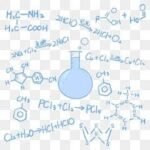Key Chemical Reactions: Unveiling the Building Blocks of Chemistry
Welcome to our website, where we explore the essential chemical reactions that form the foundation of the field. Chemical reactions are fundamental processes that drive the transformations of substances and shape our world. Join us as we delve into the intricacies of key chemical reactions, uncovering their significance, applications, and impact on various fields of study.

- Combustion Reactions: Combustion reactions involve the rapid oxidation of a substance in the presence of oxygen, typically accompanied by the release of heat and light. These reactions are crucial for energy production, such as in the burning of fossil fuels, wood, or other organic materials. Combustion reactions are also central to the functioning of internal combustion engines and power generation.
- Acid-Base Reactions: Acid-base reactions involve the transfer of protons (H+) from an acid to a base. They play a fundamental role in chemistry and everyday life. Acid-base reactions are responsible for the sour taste of citrus fruits, the fizzing of carbonated beverages, and the neutralization of stomach acid by antacids. They are also vital in industrial processes, water treatment, and chemical analysis.
- Oxidation-Reduction (Redox) Reactions: Redox reactions involve the transfer of electrons between species. Oxidation refers to the loss of electrons, while reduction refers to the gain of electrons. These reactions are essential in energy production, such as in the combustion of fuels and the operation of batteries. They are also crucial in biological systems, corrosion processes, and various industrial applications.
- Precipitation Reactions: Precipitation reactions occur when two soluble substances combine to form an insoluble solid, known as a precipitate. These reactions are vital in analytical chemistry, where they are used to detect and identify certain ions. Precipitation reactions also play a role in environmental processes, such as the formation of sediment in bodies of water.
- Hydrolysis Reactions: Hydrolysis reactions involve the breaking of chemical bonds through the addition of water molecules. They are essential in various biological processes, such as the digestion of food, the breakdown of complex molecules, and the synthesis of biomolecules. Hydrolysis reactions are also significant in industrial processes, such as the production of soaps and detergents.
- Addition and Elimination Reactions: Addition and elimination reactions involve the addition or removal of atoms or functional groups from a molecule. They are prevalent in organic chemistry and are crucial for the synthesis of complex organic compounds. Addition and elimination reactions are key steps in the production of pharmaceuticals, polymers, and many other organic products.
- Substitution Reactions: Substitution reactions occur when one atom or group in a molecule is replaced by another atom or group. They are essential in organic synthesis and play a central role in the modification of organic compounds. Substitution reactions are extensively utilized in the production of agrochemicals, pharmaceuticals, and materials with specific properties.
At our website, we explore the intricacies of these key chemical reactions, unraveling their importance and applications in various fields. Join us as we delve into combustion, acid-base, redox, precipitation, hydrolysis, addition, elimination, and substitution reactions. Welcome to a place where the building blocks of chemistry come to life, illuminating the remarkable transformations that shape our world.

